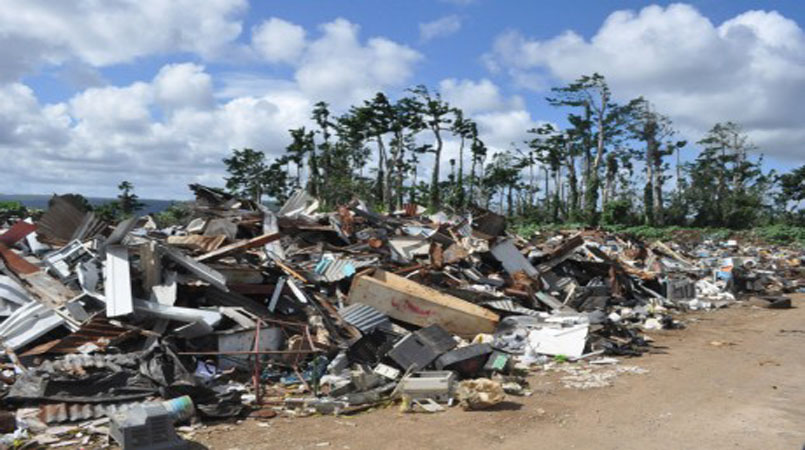
For two unemployed youths in Port Vila, Vanuatu’s capital, the opportunity to find short-term employment came at a time when many homes and property destroyed and lives affected following the devastation left behind by Tropical Cyclone Pam.
For two months, Lindes Kalo and Paul Andrew joined 129 people in Port Vila and Tanna, helping to clean up significant quantities of debris in the form of fallen trees and vegetative matter, mixed with smaller volumes of windblown building materials and household goods and wastes.
The emergency employment scheme was a component of UNDP’s Waste Management and Livelihood Recovery Initiative under the Cyclone Pam Recovery and Resilience in Vanuatu project. Through this initiative, the most vulnerable men and women were selected to clear debris, recover and recycle waste. The jobs provided the affected communities with much needed cash and tools to help restore their livelihoods.
Partnering with the Port Vila and Lenakel Municipal Councils, the debris removal was the first and most essential stage of early recovery. Safe waste removal and recycling prevents sanitation and water-borne related diseases. Debris removal also enabled communities to make room to eventually rebuild or repair damaged infrastructure, businesses, trading ports, buildings and boats.
In Port Vila, the scheme commenced in April 2015 and implemented in peri-urban areas including a temporary landfill in Korman and the Bouffa landfill at different stages, in order to support the debris clearance. In Tanna, priority was the Lenakel and Isangel areas, and commenced in May 2015.
According to the Port Vila Municipal Council’s Town Clerk, Ronald Sandy, “It would have been a burden to us to do all the clean up on our own, and would have taken about a year to clean up because we have limited resources.”
Mayor of the Lanekel Municipality, Reginald Tangpa also agreed that without this Initiative, “I just don’t know how we would have coped with removing all the debris.”
Twenty-three-year olds, Kalo who stays with her family in Naburu and Andrew from in the Number 3 area, were both thankful to have been able to contribute to their families rebuilding efforts.
“One side of the roof of our sleeping house was ripped off and our kitchen was completely destroyed when Cyclone Pam hit. It was terrible,” said Kalo.
“I really enjoyed being part of the initiative. I earned money, which I gave to my parents to help buy food for the family and to fix our house.”
“We had some damage to our home,” said Andrew, who had heard about the scheme from a relative. “The first pay that I received, I bought timber and the second pay, I used to buy second-hand roofing iron to repair my home.”
Beneficiaries in Tanna, Wilfred Iaassare from Lounahuni and Alan Naausien from Loumelaben both lost their homes and everything they owned during the Cyclone.
According to Iaassare, after participating in the emergency employment scheme, he was inspired to rebuild his home.
Prior to the start of the start of the initiative, all candidates went through a rigorous orientation programme, which covered the health and safety aspect of the work. This allowed the beneficiaries to fully appreciate the importance of personal health and safety when exposed to the elements and handling of sharp objects.
Kalo agreed that her two weeks in the orientation programme was tuff(“Bislama” to express ultimate satisfaction or excellence).
“I liked the project because I learned about proper disposal of waste and I like cleaning the environment,” said Mr. Andrew.
“We enjoyed cleaning and laughing with other youth members. This helped us forget about the impact of Cyclone Pam on our homes, families and ourselves,” said Kalo.
Naausien added that he enjoyed working with other community members to clean up their communities.
Reflecting on the impact of Cyclone Pam, Mayor Tangpa said that the Lenakel Municipal Council realizes the need for more proper planning and the need to implement proper building policies.
In total, 129 people (including 69 women) were temporarily employed for a total number of 1,920 working days. It is estimated that over 2,465 cubic meters of debris have been removed. The two municipalities also received heavy equipment (including garbage trucks) to improve their waste management efforts.
UNDP’s Waste Management and Livelihoods Recovery Initiative in Vanuatu has two components: debris clearance and waste management in urban areas, and livelihood restoration in rural areas. This collaboration between UNDP and the Department of Local Authorities has been further assisted by the Russian Government with the provision of an additional funding of US$500,000 to the project to continue its Tropical Cyclone Pam recovery and resilience activities in Vanuatu.
